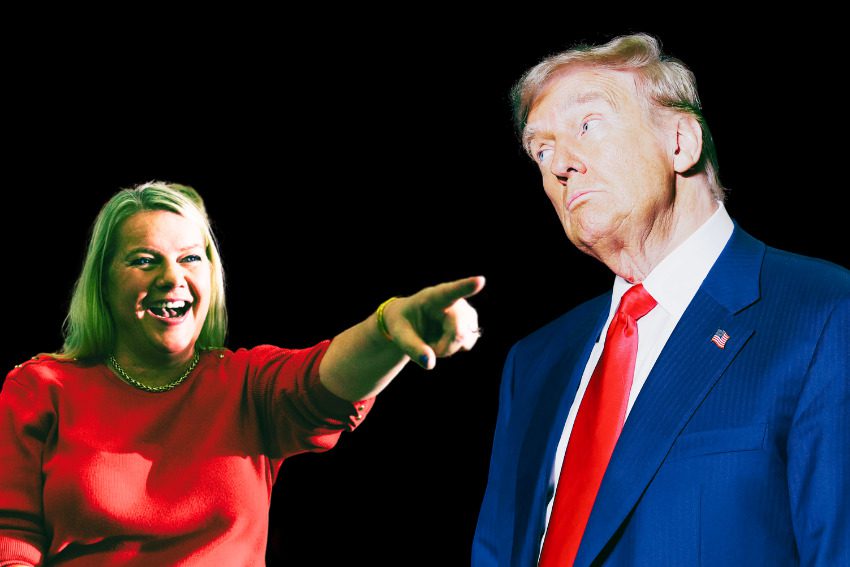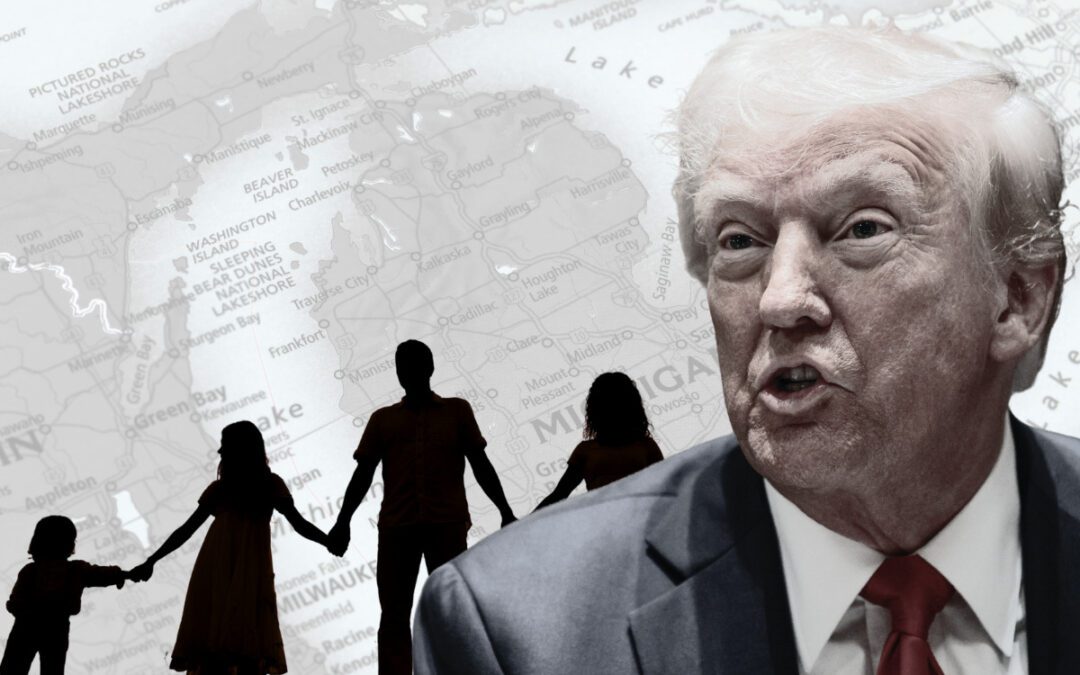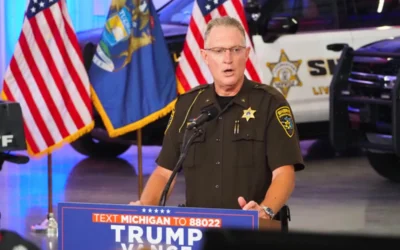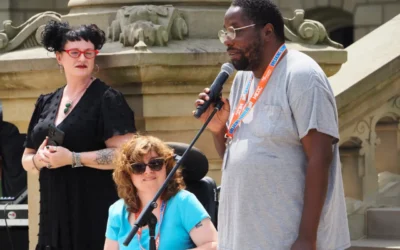
Photo Illustration/Anna Moneymaker/Emily Elconin/Getty Images
Most of the Michiganders selected as Republican presidential electors for ex-President Donald Trump this year have a record of pushing baseless election conspiracies.
MICHIGAN—Nine of Michigan’s 15 Republican electors this year are election deniers who continue to promote the false claim that President Joe Biden lost the 2020 presidential election.
That includes six individuals who were among a group of “fake electors” criminally charged for attempting to overturn the 2020 election, as well as three others who have pushed baseless conspiracy theories about fraud in the 2020 presidential election, according to a CNN survey.
What are presidential electors?
The elector process is part of the Electoral College, which elects the president of the United States. Each state appoints a slate of people (called electors) who pledge to vote for the winning presidential candidate in their state. In Michigan, there are 15 electors—a number designed to reflect the number of senators and representatives the state has in Congress.
Before Election Day, each of Michigan’s political parties pick a slate of 15 electors.
After the votes are counted, the slate for the candidate who wins Michigan’s popular vote is certified to cast the state’s electoral votes. Those votes are then sent to Congress, where they’re officially counted to declare the winner of this year’s presidential election.
What’s a “fake” elector?
In 2020, after Biden won Michigan, a group of Republicans falsely claimed to be the state’s legitimate electors, submitting unofficial, uncertified documents to Congress that asserted they had cast Michigan’s official electoral votes for Trump.
These individuals—who became known as “fake electors”—pushed baseless conspiracy theories about election fraud and argued that they were acting as a backup slate of presidential electors, in case Trump’s various legal challenges to the election results were to succeed.
However, no courts validated these claims, and the state’s official, certified electors had already cast their votes for Biden. Despite the lack of official standing, the group of Trump supporters still gathered and signed documents declaring themselves the state’s electors, then submitted them to Congress and the National Archives—mimicking the paperwork sent by official electors.
This attempt to subvert the election results led to confusion over Michigan’s electoral results and played into Trump’s narrative that the election was being stolen from him . Ultimately, it did not affect the outcome of the election—though several of these fake electors now face criminal charges over the scheme.
What’s happening this year?
Of the seven states where Trump tried to overturn the election results in 2020, Michigan’s 2024 slate of Republican electors has the largest share of election deniers, according to CNN. Nine electors have promoted baseless conspiracies, including six who acted as fake electors in 2020.
This includes Meshawn Maddock, Marian Sheridan, Amy Facchinello, Hank Choate, John Haggard, and Timothy King—all of whom are now back on Trump’s official slate of electors.

Maddock, who helped organize buses to travel to Washington DC, on the day of the Jan. 6 insurrection, has repeatedly described her work with election and campaign volunteers as “training an army.” Her husband (and at least one other Republican state representative) have also been identified among the Michigan Republicans who were in Washington DC on the day of the Jan. 6 riots.

Haggard Photo: Anna Liz Nichols/Michigan Advance
Sheridan, who has since been re-elected as grassroots vice chair of the Michigan Republican Party; Facchinello, a Grand Blanc school board member; and Choate, Michigan Farm Bureau’s volunteer of the year last year, have also returned as electors, alongside Haggard and King—who also both participated in failed lawsuits challenging Michigan’s 2020 election results.

Three additional 2024 Trump electors—Jim Tokarski, Linda Glisman, and Andrew Sebolt—are also election deniers. Tokarski reportedly told the Detroit News that the 2020 election was “stolen,” while both Glisman and Sebolt have said it was “rigged” against Trump.
What’s at stake?
Across the seven states—including Michigan—where Trump tried to overturn the 2020 election, Republicans who actively deny the legitimacy of that election now make up more than one-third of the 82 electors chosen to support Trump in 2024, according to the recent CNN survey.
And the continued involvement of these election deniers in the Electoral College process, particularly in a critical battleground state like Michigan, could lead to future “post-election chaos” if Trump were to lose and the electors try (again) to overturn the results.
Experts warn that having these election deniers in official roles also shows how a substantial part of the Republican Party continues to embrace Trump’s election denialism and poses an ongoing risk to the integrity of the Electoral College process ahead of this year’s election.
“Those who participate in election fraud should be held accountable, not given another bite at the apple,” Lindsey Miller, a research director at Informing Democracy, a nonprofit that works to safeguard the vote-counting and election certification process, told CNN.
READ MORE: Fake Michigan electors face tough times after attempt to overturn election
For the latest Michigan news, follow The ‘Gander on Twitter.
Follow Political Correspondent Kyle Kaminski here.
Support Our Cause
Thank you for taking the time to read our work. Before you go, we hope you'll consider supporting our values-driven journalism, which has always strived to make clear what's really at stake for Michiganders and our future.
Since day one, our goal here at The 'Gander has always been to empower people across the state with fact-based news and information. We believe that when people are armed with knowledge about what's happening in their local, state, and federal governments—including who is working on their behalf and who is actively trying to block efforts aimed at improving the daily lives of Michigan families—they will be inspired to become civically engaged.


OPINION: Keep the lights on for Michigan electrical workers, save clean energy investments
Trump’s attacks on clean energy are setting Michigan back. For more than 100 years, the members of the International Brotherhood of Electrical...

Report: Billionaire accused in Florida prostitution sting donates $12k to boost Mike Rogers’ Senate campaign
It’s the latest example of Rogers’ bid for US Senate being bankrolled by controversial figures—including a Texas oil mogul who pushes Christian...

Michigan Democrats call for GOP response to leaked, slur-filled Young Republicans’ chat
BY KATHERINE DAILEY, MICHIGAN ADVANCE MICHIGAN—In the wake of a report from POLITICO detailing a chat among leaders of Young Republicans’ chapters...

Opinion: The America my parents believed in is disappearing
Michigan State Rep. Mai Xiong reflects on the fear Trump's immigration policies are causing for Michigan families. Last November, I wrote in the...

Activists, officials call for closure of Ottawa County coal plant as utility looks to recover costs
BY SARAH LEACH, MICHIGAN ADVANCE OTTAWA COUNTY—“We are standing here today to stand up to the Trump Administration to tell them, ‘Get this coal...





